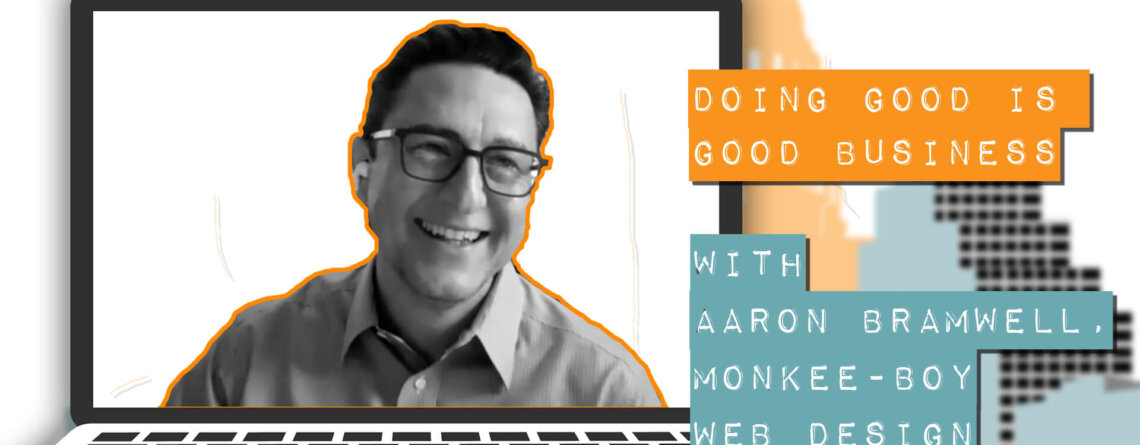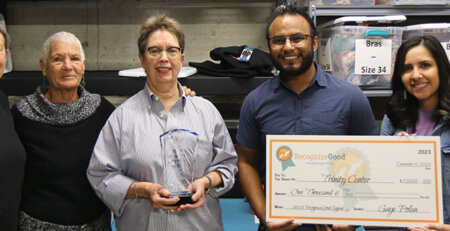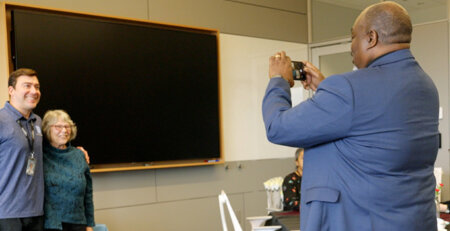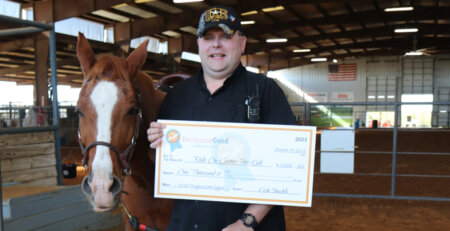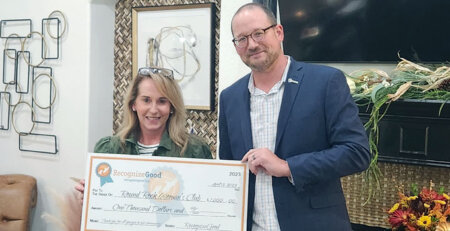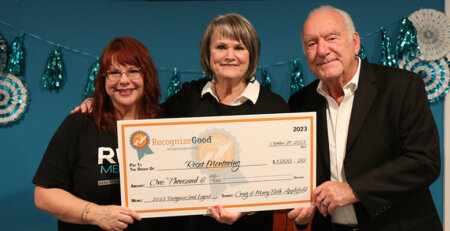Right Thing = Good Business w/ Aaron Bramwell, Monkee-Boy Web Design, Inc.
RecognizeGood: We’ve got this general theme of people over profits that we’re really highlighting this year and that is the Monkee-Boy motto. Let’s start there. How did you and Joe (Pickerill, co-founder and CMO) come up with that as your credo? And what’s that look like in practice?
Aaron Bramwell: Part of the history behind it is that we never worked for another agency besides Monkee-Boy. We’ve created this organically over the years. It started as a side project – everybody trusted us and we tried to really focus on good work and just kept growing. When you start as a business owner, learning what you don’t know a lot of – the mechanics of running the business – you inherit those from other people: colleagues, other business owners, etc., and a lot of what we heard for probably the first decade or so was, “You’ve got to increase at a 20% clip year over year and your profit margin blah blah blah.”
We got to a point where we realized, about four or five years ago, that it’s a monster you can’t keep fed 100% of the time the bigger you grow. The bigger those targets, the more it changes the way you do business, and the more it forces your hand and removes control over how you really want to do things. We had this weird epiphany. It’s not weird in hindsight, but at the time we were like, “Why didn’t we think about this so much earlier?”
We don’t need to hit a certain growth clip every single year. There is a super happy equilibrium where we have enough people and enough work to keep everybody happy and put money away into the “protection and possibilities” fund. This approach allows us to work with the organizations we want to work with and help them the way we need to help them. This let’s us find the win/win/win where we there are good fits all around – for our staff, our clients, and the business.
We’re pretty humble guys, and when we finally found that approach of saying all right, this is plenty for everybody and if we focus on our staff and focus on just doing good work, ultimately everything does get easier at the end of the day. So that’s kind of the history behind it, and it’s really served us well. It’s been on autopilot for the last couple of years, which has been great, especially through some of these more interesting times over the past year or so.
RecognizeGood: Do you think that you could do that if you had 10 times as many people? Or is it is it helpful to have a ‘troop’ of 15 to be able to implement that?
Aaron: Some of our challenges have been growth as people have gone home and there’s been more attention paid to digital. We’ve been forced to grow. We’ve actually hired six people in the past year. Some of them, I’ve never even met in person. So you now have to figure out how to adjust your hiring process and your onboarding process and your communication process, to help them understand the ethos of the company and get onboard and feel like they’re a valued part of the team.
That’s been one of the most interesting things that we’ve done over the past year. And in spite of trying to keep things as controlled as possible, growth is still there; it still happens. But as the shift to online and digital is just a thing now, we’ve been forced to expand and think through some of those things, so it’s an interesting question. Personally, the amount of time that we put into our people – there’s only so much of us that we can invest, and do it thoughtfully and thoroughly and intentionally. As that becomes fractured across the bigger staff, I think a lot of that that love may not go as far as it does currently.
It’s a super interesting question. At some point, where the tipping point is, I don’t really know, but we’re just under 20 people now and so far, things are good, but it’s been an interesting adjustment to keep that in place as we continue to grow and build.
RecognizeGood: Sometimes that’s an indicator of how seriously an organization takes this stuff. Do you have a person whose full-time job is to be a hub for employee well-being, do you have a bunch of programs and policies or is it more like the smaller you are, the more it can be art over science?
Aaron: 100%, yeah. I mean we’ve always run as lean as we can. That’s one of the ways that we can focus more on our people and less on profit, is not having a ton of overhead that is going to force us to make decisions that don’t feel like the right decisions for the company. But yes, that’s been a lot of the conversations that have changed over the past year. Checking in on your team, checking in with your manager, making sure everyone’s mental health is in a good spot. See if they need anything. Send them cookies.
What can you do to help them just feel like they’re part of the company and part of the family and they’re appreciated for all that they do? People have different types of needs in the world, and some of them are happy to sit in their little dark room and code all day and that’s a perfect position for them, and some of them really do need a little bit more support in any way, shape or form.
I think that’s part of being a good manager at the end of the day – understanding the needs of your people but helping drive that home further into the company. It’s an interesting exercise that is something that I think we’ve always done. But when something like a pandemic hits you, you start to see where the cracks might be.
RecognizeGood: One of the things that really stuck out to our student examiners and our selection panel was how important transparency is to you and Joe both. Why is that so paramount?
Aaron: I think that stems from the way Joe and I are wired. Before Monkee-Boy, we worked at a lot of companies (big and small) and honestly we’ve both been laid off before too. When this happens, you realize how it’s a very emotional event – it catches you off guard, you start to question yourself, your craft, and your participation when a lot of times it could just be a business thing, right? It’s not anything personal. It’s just that something happened in the business.
So we decided years ago that we needed security; it’s always been super important to us. Security for each other, for our staff and for their families. This was the genesis of our bimonthly meetings called the “State of the Jungle” meetings where we have the whole staff together, and we basically say – “you work your butts off for us day in and day out and do whatever it takes to help our clients evolve online, and now we want to be accountable to you and show you that we’re doing our job and the health of the company is in good shape, that it’s running really well.”
So we show them the financial forecast as far out as we can. We show them how it compared to previous years and what might be a trend, seasonal, or something of concern. We show them how the business works and answer any questions they have so that they walk away with a greater understanding of the health of the agency and how agencies run.
We didn’t have that when we were building Monkee-Boy. There was no playbook or community or the things that exist today – we failed all over the place. We fell flat on our face thousands and thousands of times. To expose some of these things to our team helps them understand that as a service company there are peaks and valleys – you may kill it one month and tank it the next month… that’s part of the journey. You shouldn’t get too high or too low as there are more ways down when you’re at the top of the mountain and more ways up when you’re on the bottom. But at the same time, if/when you’re at the bottom, in the crux of the valley, it doesn’t mean personally you’ve done something wrong or we’ve done anything wrong. If we have a bad month it’s just a data point and we used that to continuously course correct, This is just how these types of businesses run and, as a result, they now have some perspective on why we make some of the business decisions we do to help increase our recurring revenue, are constantly tinkering with things and continuously diversifying to provide a greater security for everyone.
To expose that to them really gives them some comfort so they can focus on their work, keep their heads high, and continue to sharpen their craft – and not have to worry about getting waylaid by some round of layoffs or waylaid by some potential force of nature that might be happening in the industry. You know, “Aaron and Joe are paying attention to that kind of stuff!”
Joe and I being family men, we don’t travel at all. We have a unwritten “home for dinner” policy. I don’t remember the last time I took an overnight flight anywhere for a client. It’s always there and back by dinner. It may limit our prospects some but you can cover a lot of Texas in a day trip so that creates our radius of clients. And that seems to resonate with our staff. They like that security, they like the comfort, they like the work/life balance. A lot of our best employees have come from places that were just terrible places to work with no transparency, so it continues to build trust with them as well.
One of the exit interview questions we use anytime somebody leaves, for whatever reason they do leave, is “did we have enough or too much or not enough transparency? Tell us your thoughts.” You never really know what kind of answers you’re going to get, but I can say that 100% of the time it’s been that the transparency has been fantastic.
Especially in this last year, there’s been a lot more fear than normal when you see businesses going under left and right because they weren’t ready for something like a pandemic that nobody plans for. Who plans for a pandemic? Nobody. Nobody has. But if you’re running a healthy business, then in theory you should be able to withstand and outlive it and it’s very easy to tell the staff, “Guys, take a deep breath, we’re good. We know there’s a lot of bad news. We know there’s a lot of weird things going on in the economy. Everybody here is safe. You guys do not need to worry about job security so let’s just focus on execution and we’ll tackle the next problem tomorrow.”
RecognizeGood: What about the idea of cutting corners? How easy it is for the sake of saving 100 bucks here, or cutting off an extra 30 minutes here to be maybe more productive, to just overlook that extra check-in time for well-being? You said that not cutting corners is a necessity and something that can be constantly improved. Can you talk a little bit about that mindset that y’all have as founders and maybe whether or not it’s tempting to cut those corners? Or are you constantly validated by not cutting the corners and seeing the benefits there?
Aaron: I think it’s a delicate dance, right? I mean as a business owner, you’re always trying to run the most efficient operation possible and there’s lots of different ways to increase efficiency. One of those ways is to figure out how you can cut corners. We’ve always had a full-time team. There’s only a couple small services that we outsource from time to time where we feel the product would be better than what we could deliver in house. In digital, there’s a lot of different ways to deliver a product. It’s like buying a car. It has four wheels that gets you from place A to place B. The experience though, is really where the difference comes in, and so in terms of cutting corners, it’s always been about our focus on quality. It’s doing the right thing, doing our best, showing people that we care as much as we can for not just customers but anybody that might come in contact with the organization.
And what we’ve seen and what continues to be true is that when we really put quality first, quality relationships, quality information, quality conversations, quality product we don’t have to [cut corners]. We basically see efficiencies in other areas. For an example, we have a full-time marketing team, but we don’t market ourselves because we do focus on quality and people talk. Austin is one of the biggest small cities on the planet and if you do bad work, you should leave town because everybody talks! So our marketing strategy has been do great work and everybody will tell their friends and people will come back. That’s served us well for 23 years.
I think as a business owner, you have to go through that process. I would say a decade ago we tried to figure out how could we productize some of the stuff and streamline and cut those corners of code or design or strategy. We realized quickly that nobody was happy with the results. Once we did shift and just focus on better products, better conversations, it’s continued to just pay off for us every single day.
Sad to say, even just by calling people back we get so much goodwill in the community and even around Texas by just returning phone calls and trying to help people. That’s an opportunity where we could just say they’re not a good fit – their budget, their timeline, or the technology they need just isn’t something we specialize in. It’d be very easy just to ignore them. And that could be considered cutting corners for efficiency in my calendar, but we really do love helping. We have just as many Google reviews from people we’ve never worked with that we helped find a better home as we do those that we have helped. I get a ton of joy out of helping people because there’s a lot of people that call us in a lot of organizational pain. They don’t even know where to start. They don’t know what questions to ask, and so just being able to let them feel heard and point them in the right direction, or even just say listen, go here. Here’s a blog post. Follow these instructions and you can do everything yourself. That just empowers them to let them take a deep breath and take the next step with a little bit of confidence. It does permeate through our whole company in different ways, but again, it comes back to quality from the conversations to what we deliver to our clients.
RecognizeGood: I’m a firm believer in that goodwill!
Aaron: It’s just shocking how much it does come back. It could be six months since we talked to somebody, and they weren’t a good fit for some reason and then they come back and tell us they want to work with us and ask what they need to do. And it could be they changed their tech stack. They changed their process. They let us lead, and that’s just super. It underscores that it’s the right thing to do and there’s other people that may come back years later.
You never really know when it’s going to come back, but you just gotta trust that doing the right thing and showing people that you care is just a great way to work and a great way to do business.
